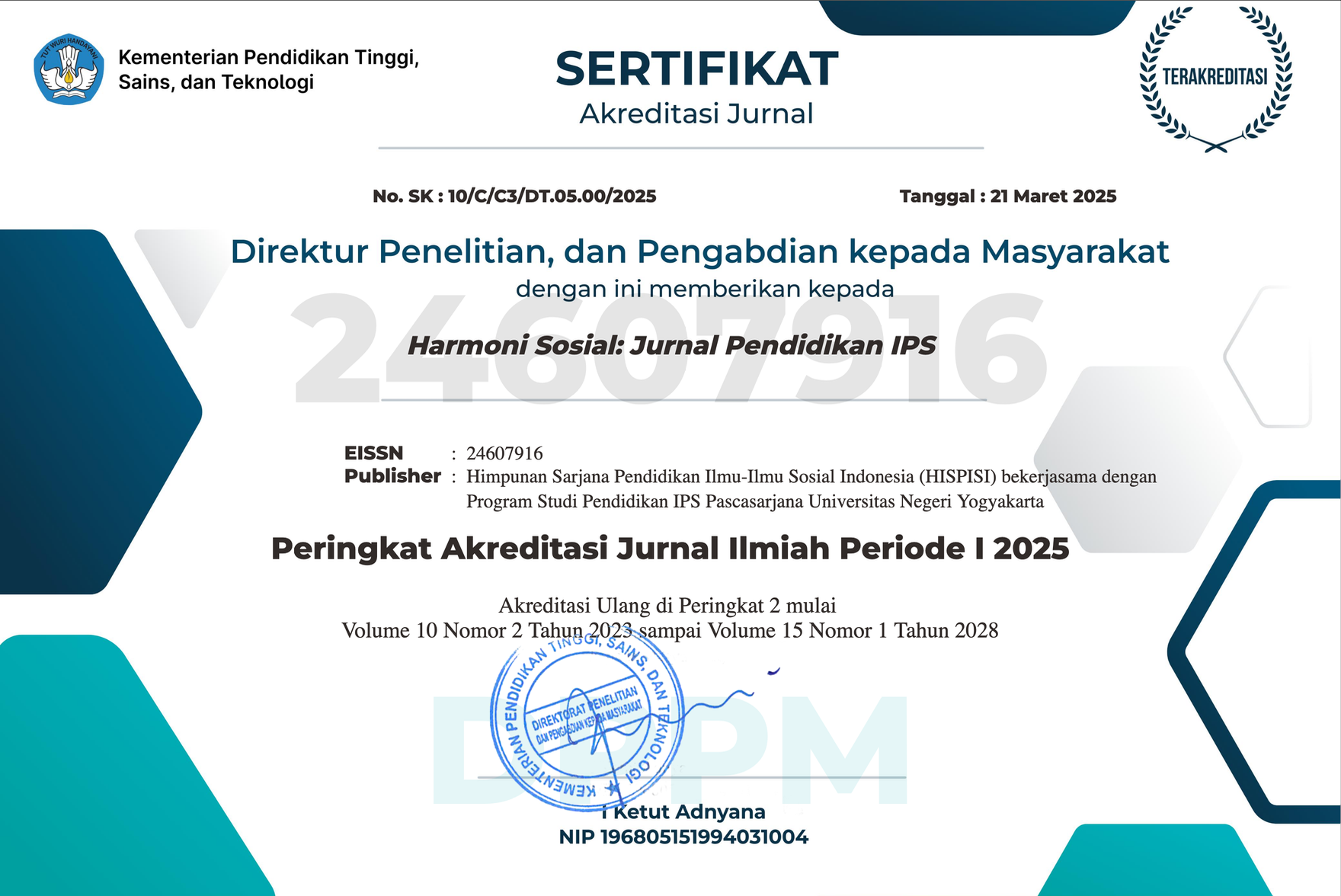Analysis of learning motivation in improving learning outcomes in economics subjects between students of class XI social sciences and class XI natural sciences
Downloads
Downloads
Astuti, E.S., & Resminingsih. (2010). Bahan Dasar untuk Pelayanan Konseling pada Satuan Pendidikan Menengah Jilid I. Jakarta : PT. Grasindo
Ames, C. (1992). Classrooms: Goals, structures, and student motivation. Journal of Educational Psychology, 84(3), 261-271. DOI: 10.1037/0022-0663.84.3.261
Bandura, A. (1986). Social foundations of thought and action: A social cognitive theory. Englewood Cliffs, NJ: Prentice Hall. DOI: 10.5465/amr.1987.4306538
Boone, H. N., & Boone, D. A. (2012). Analyzing Likert data. Journal of extension, 50(2), 1-5.
Bryman, A., & Bell, E. (2015). Business research methods. Oxford University Press, USA.
Cohen, J. (1988). Statistical power analysis for the behavioral sciences. Lawrence Earlbaum Associates, 2.
Creswell, J. W. (2014). Research design: Qualitative, quantitative, and mixed methods approaches. Sage publications. DOI: 10.1177/1524839915580941
Deci, E. L., Vallerand, R. J., Pelletier, L. G., & Ryan, R. M. (1991). Motivation and education: The self-determination perspective. Educational Psychologist, 26(3-4), 325-346. DOI: 10.1207/s15326985ep2603&4_6
Deci, E. L., & Ryan, R. M. (1985). The general causality orientations scale: Self-determination in personality. Journal of Research in Personality, 19(2), 109-134. DOI: 10.1016/0092-6566(85)90023-6
Dweck, C. S., & Leggett, E. L. (1988). A social-cognitive approach to motivation and personality. Psychological Review, 95(2), 256-273. DOI: 10.1037/0033-295X.95.2.256
Eccles, J. S., & Wigfield, A. (2002). Motivational beliefs, values, and goals. Annual Review of Psychology, 53, 109-132. DOI: 10.1146/annurev.psych.53.100901.135153
Etikan, I., Musa, S. A., & Alkassim, R. S. (2016). Comparison of convenience sampling and purposive sampling. American Journal of Theoretical and Applied Statistics, 5(1), 1-4. DOI: 10.11648/j.ajtas.20160501.11
Field, A. (2013). Discovering statistics using IBM SPSS statistics. SAGE.
Fraenkel, J. R., Wallen, N. E., & Hyun, H. H. (2011). How to design and evaluate research in education. New York: McGraw-Hill.
Ghasemi, A., & Zahediasl, S. (2012). Normality tests for statistical analysis: a guide for non-statisticians. International Journal of Endocrinology and Metabolism, 10(2), 486-489. DOI: 10.5812/ijem.3505
Gliem, J. A., & Gliem, R. R. (2003, October). Calculating, interpreting, and reporting Cronbach's alpha reliability coefficient for Likert-type scales. In Midwest Research-to-Practice Conference in Adult, Continuing, and Community Education.
Israel, M., & Hay, I. (2006). Research ethics for social scientists. Sage. DOI: 10.4135/9780857021496
Liem, A. D., & Martin, A. J. (2012). The Motivation and Engagement Scale: Theoretical framework, psychometric properties, and applied yields. Australian Psychologist, 47(1), 3-13. DOI: 10.1111/j.1742-9544.2011.00049.x
Likert, R. (1932). A technique for the measurement of attitudes. Archives of psychology.
Kaplan, A., & Maehr, M. L. (2007). The contributions and prospects of goal orientation theory. Educational Psychology Review, 19, 141-184. DOI: 10.1007/s10648-006-9012-5
Marsh, H. W., & O'Mara, A. J. (2008). Reciprocal effects between academic self-concept, self-esteem, achievement, and attainment over seven adolescent years: Unidimensional and multidimensional perspectives of self-concept. Personality and Social Psychology Bulletin, 34(4), 542-552. DOI: 10.1177/0146167207312313
Palinkas, L. A., Horwitz, S. M., Green, C. A., Wisdom, J. P., Duan, N., & Hoagwood, K. (2015). Purposeful sampling for qualitative data collection and analysis in mixed method implementation research. Administration and Policy in Mental Health and Mental Health Services Research, 42, 533-544. DOI: 10.1007/s10488-013-0528-y
Pallant, J. (2020). SPSS survival manual: A step by step guide to data analysis using IBM SPSS. Routledge. DOI: 10.4324/9781003117452
Pajares, F. (1996). Self-efficacy beliefs in academic settings. Review of Educational Research, 66(4), 543-578. DOI: 10.3102/00346543066004543
Pintrich, P. R., & De Groot, E. V. (1990). Motivational and self-regulated learning components of classroom academic performance. Journal of Educational Psychology, 82(1), 33-40. DOI: 10.1037/0022-0663.82.1.33
Reeve, J., & Jang, H. (2006). What teachers say and do to support students' autonomy during a learning activity. Journal of Educational Psychology, 98(1), 209-218. DOI: 10.1037/0022-0663.98.1.209
Ryan, R. M., & Deci, E. L. (2000). Intrinsic and extrinsic motivations: Classic definitions and new directions. Contemporary Educational Psychology, 25(1), 54-67. DOI: 10.1006/ceps.1999.1020
Schunk, D. H. (1991). Self-efficacy and academic motivation. Educational Psychologist, 26(3-4), 207-231. DOI: 10.1080/00461520.1991.9653133
Schunk, D. H., Pintrich, P. R., & Meece, J. L. (2008). Motivation in education: Theory, research, and applications. Upper Saddle River, NJ: Pearson/Merrill Prentice Hall. DOI: 10.1111/j.1467-8721.2008.00525.x
Sugiyono, S. (2017). Metode Penelitian Kuantitatif Kualitatif dan R&D. Bandung : Alfabeta
Silondae, S., & Priyatmo, D. (2019). Perbandingan Motivasi Belajar Antara Siswa Jurusan MIPA dan Jurusan IPS di SMA Negeri Anggaberi Kabupaten Konawe. Gema Pendidikan, 26(2), 1-9. DOI: http://dx.doi.org/10.36709/gapend.v26i2.8174
Teddlie, C., & Yu, F. (2007). Mixed methods sampling: A typology with examples. Journal of Mixed Methods Research, 1(1), 77-100. DOI: 10.1177/2345678906292430
Vansteenkiste, M., Lens, W., & Deci, E. L. (2006). Intrinsic versus extrinsic goal contents in self-determination theory: Another look at the quality of academic motivation. Educational Psychologist, 41(1), 19-31. DOI: 10.1207/s15326985ep4101_4
Wentzel, K. R. (1998). Social relationships and motivation in middle school: The role of parents, teachers, and peers. Journal of Educational Psychology, 90(2), 202-209. DOI: 10.1037/0022-0663.90.2.202
Wigfield, A., & Eccles, J. S. (1994). Children's competence beliefs, achievement values, and general self-esteem: Change across elementary and middle school. Journal of Early Adolescence, 14(2), 107-138. DOI: 10.1177/027243169401400203
Wigfield, A., & Eccles, J. S. (2000). Expectancy–value theory of achievement motivation. Contemporary Educational Psychology, 25(1), 68-81. DOI: 10.1006/ceps.1999.1015
Zimmerman, B. J. (2000). Attaining self-regulation: A social cognitive perspective. Handbook of self-regulation, 13-39. DOI: 10.1016/B978-012109890-2/50031-7
The Authors submitting a manuscript do so on the understanding that if accepted for publication, copyright publishing of the article shall be assigned to Harmoni Sosial: Jurnal Pendidikan IPS
 | Harmoni Sosial: Jurnal Pendidikan IPS by http://journal.uny.ac.id/index.php/hsjpi is licensed under a Creative Commons Attribution-ShareAlike 4.0 International License. |










 ISSN Print
ISSN Print









